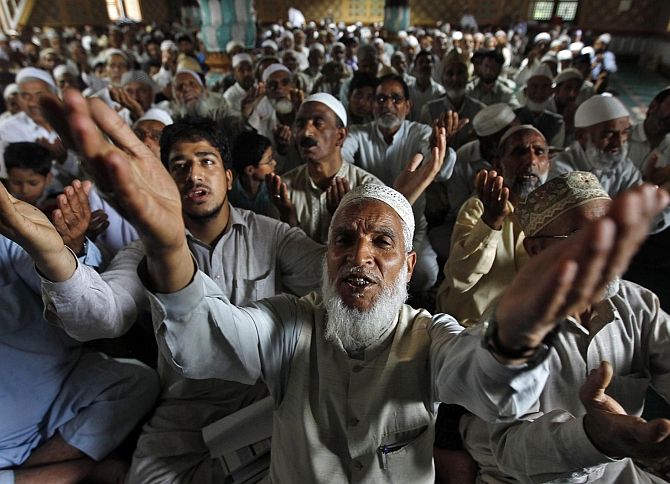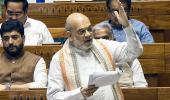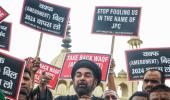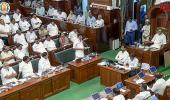The All India Muslim Personal Law Board (AIMPLB), a major organisation representing Muslims in India, on Wednesday said it will challenge the Waqf (Amendment) Bill in court and take the fight against the "black law" that threatens the community's rights to the streets.

The Waqf Bill was tabled in the Lok Sabha for discussion and passage on Wednesday. If passed by the Lower House, the Bill will be tabled in the Rajya Sabha.
Criticising the proposed legislation at a press conference, AIMPLB member Mohammed Adeeb claimed it was an attempt to seize properties of the Muslim community.
"They have started this spectacle thinking they can take away our property. Can this be accepted? Do not think that we are defeated," Adeeb said.
Stating that the Bill was opposed during deliberations of the Joint Parliamentary Committee (JPC) set up to review it, Adeeb said, "It should not be assumed that we have lost the battle. We have just begun. This is a fight to save the country because the proposed law endangers the very fabric of India."
He urged all conscientious citizens to resist the Bill and reaffirmed the AIMPLB's commitment to oppose it both legally and through public demonstrations.
"We will go to court. We will not rest until this (proposed) law is withdrawn," he added.
AIMPLB Vice President Mohammad Ali Mohsin said the Muslim body "categorically rejects" the Waqf (Amendment) Bill 2025, describing it as discriminatory, communally motivated and a blatant infringement on the constitutional rights of Muslim citizens.
AIMPLB spokesperson Mohammad Ali Mohsin said, "We have started this fight because we want to save the country. Our aim is to put an end to this black law."
He said board members will hold nationwide protests on the lines of the farmers' agitation.
"We will organise programmes across the country just like farmers did. If needed, we will block roads and take all peaceful measures to oppose the bill," Mohsin said.
He said that the Bill undermines fundamental principles of religious freedom, equality and justice, enshrined in Articles 14, 25 and 26 of the Constitution.
He outlined several key objections, including concerns that the Bill erodes Waqf Board autonomy by altering its composition and introducing non-Muslim members, thereby compromising the community's right to manage its own religious and charitable endowments.
The AIMPLB also warned that the Bill disrupts Waqf management by empowering government entities to seize Waqf properties, thereby threatening their very existence.
Furthermore, board members said that amendments regarding the creation and management of Waqf endowments are regressive and detrimental to Muslim interests.
The JPC's report, according to the AIMPLB, failed to address these concerns and instead perpetuated the Bill's flaws.
In a press statement issued after the press conference, the AIMPLB urged all secular and non-communal parties, as well as "conscientious" MPs, to reject the "divisive" Bill and uphold constitutional principles of equality, justice and religious freedom.
It also called on MPs not to stage a walkout but to engage in debate and press for a vote in both houses of Parliament, thereby compelling NDA allies and fence-sitters to take a stand against the legislation.
The AIMPLB called on citizens across the country to take to the streets and hold peaceful and democratic protests if the Bill is passed, vowing to continue demonstrations until it is withdrawn.
Senior executive member of AIMPLB Maulana Khalid Rashi Farangi Mahali told PTI, "The AIMPLB and other Muslim organisations have conveyed their concerns over the Bill to the Joint Parliamentary Committee (JPC), but they were not considered. Following this, protests were held in cities, including Delhi and Patna, where demonstrators symbolically wore black bands to emphasise their dissent."
The Bill would be detrimental rather than beneficial for Muslims, he claimed.
"We have urged all members of Parliament to consider the sentiments of the Muslim community and reject the proposed amendments," he added.
According to the Bill, trusts created by Muslims under any law will no longer be considered Waqf, ensuring full control over them.
Only practising Muslims (for at least five years) can dedicate their property to Waqf, restoring the pre-2013 rules. Also, women must receive their inheritance before Waqf declaration, with special provisions for widows, divorced women and orphans, the Bill proposes.
It also proposes that an officer above the rank of collector will investigate government properties claimed as Waqf.
In case of disputes, the senior government official will have the final say on whether a property belongs to Waqf or the government. This replaces the existing system where such decisions are made by Waqf tribunals.
Non-Muslim members will be included in the central and state Waqf boards for inclusivity, according to the Bill.
The Bill has been met with criticism due to its contentious provisions, including allowing non-Muslim members in the Central Waqf Council and Waqf Boards, as well as provisions stating that any government property identified as Waqf will cease to be one, with the district collector determining its ownership.
Opposition parties, including the Congress, have opposed the proposed legislation, claiming that the JPC ignored their suggestions and that the Centre is rushing it through Parliament.











 © 2025
© 2025